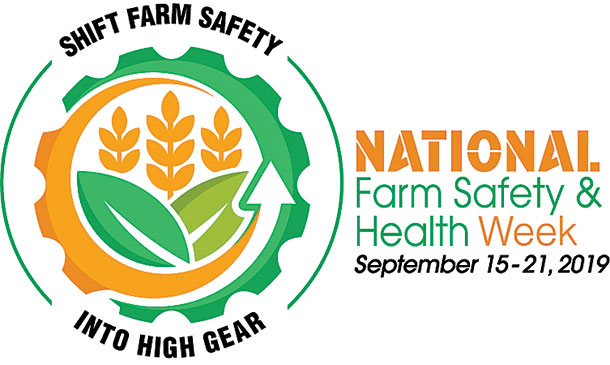Links to websites and materials listed in this article can be found through a link on the Progressive Dairy website (Farm stress: Sources and resources)
Following milking, my friend Laurie and I were driving down a country road on a hot evening in mid-June when I got the phone call that would forever change the life of my family. One of our dairy farmer neighbors, who is also a first responder, called and asked in a broken voice, “Sam, where are you? Life Flight has been called to your hayfield out on the county line. I wanted to check and see if you’re OK and what’s going on. I am headed out there now. Someone has been pulled into a baler.”
That “someone” was my husband, Darren. That moment and the ones to follow were surreal. Actually, the next several days were. One second I was happily anticipating my son’s Little League baseball game, and the next my mind was spinning out scenarios of what was happening to us. How would we get everything done? Would we need to sell some cows? What time was the milk truck coming in the morning? It was like watching a really bad movie that you can’t turn off, and the biggest problem was that we were the starring characters in roles we had not chosen or prepared for.
We were all thrust into unfamiliar territory, and the entire dynamic of our family was altered. Our teenage sons were forced into adult work and decision-making roles, while their father underwent multiple surgeries and procedures, including bone and skin grafts. His hand and arm were saved, but there are both internal and external scars.
It was nine years ago, and we are still dealing with some of the aftereffects of the trauma.
According to statistics from the Center for Disease Control (CDC), agriculture ranks among the occupations with the highest risk for injury – nonfatal and fatal. Those of us in farming are aware of the dangers. Unfortunately, it seems it is not “if” an accident will happen, but rather “when” and how serious it will be.
Research from the National Safety Council shows one out of eight farm families experience an accident requiring medical attention each year. An injury or death that happens to one person in a family affects the lives of everyone connected to that person.
For my family, the accident became a dividing line – the “before” and the “after.” In addition to the physical trauma of an injury or fatality, farm accidents add emotional stress.
Research from the National Institute for Occupational Safety and Health found farmers already face stress-related conditions such as heart and artery disease, hypertension, ulcers and nervous disorders. When compounded by an injury or fatality due to a farm accident, stress increases. Embarrassment, guilt, blame and shame are all feelings and emotions that have to be dealt with following an accident before acceptance and healing can occur.
To raise awareness surrounding farm safety, the third week of September has been recognized as National Farm Safety & Health Week (see related article below). But while National Farm Safety & Health Week was initiated in 1944, it is only in the last few years we have begun to emphasize the importance of the emotional health and well-being of people working in agriculture.
Relationships important
Developing and maintaining relationships with others are a critical piece of that healing. Keeping the lines of communication open – with freedom to share thoughts and feelings in a safe place without criticism and judgement – is what will heal emotional wounds and form a strong foundation that will enable you to build resiliency to stress.
Life gifts us with many blessings, and one of my most cherished is that I have had the same best friend since kindergarten. She and I go back a long way and have lived and loved one another through some very painful life events by challenging each other to be brave enough to accept help.
During a particularly rough patch I was unsuccessfully struggling through independently, my friend said to me, “You like to be the one who takes care of everyone else. You like to be the hostess and give of yourself to make others feel good, don’t you? This makes you happy, right?” Yes, I replied, it fills my heart with joy to help others.
She then said to me, “How dare you be so selfish? How dare you deny those feelings of joy to others? Sometimes it is much more difficult to be the receiver than the giver. Remember how gracefully others allow you to do what makes you happy and allow them the same privilege.”
This gentle reprimand provides a different perspective on accepting help from others. There are times in life when we need to be strong enough to receive help and trust in the love and support of those around us.
I have learned in order to allow healing to take place, we must first allow ourselves to feel and focus on our emotions. We cannot always work our way through problems with head-down, dogged determination. And most importantly, we must forgive ourselves and have compassion and love for ourselves so we can share love and compassion with others. We must be our own friend and our own caretaker so we are spiritually strong enough to share our emotional strength with others.
We can put the traumas and tragedies in our lives in perspective and move away from them. We do not have to carry the weight of our past into our futures. Today, we can set the burden down, and we all have the power to move into the “life after” segment of the timeline, where we have the power to make decisions that allow us to lead healthier lives that include hope and joy.
If you do not have someone in your life you feel comfortable sharing your problems with, there are other options and places you can reach out to anonymously. Either way, talking it through with someone face-to-face, picking up the phone for a chat or reaching out with a text can make all the difference. For the anonymous Crisis Text Line, text “CONNECT” to 741741, and the National Suicide Prevention Lifeline is 1-800-273-TALK (8255).
Resources available
Many universities, organizations and service providers are now working to provide tools and resources to support the agriculture community during the stressful times we live through. Here’s a partial list:
- North Dakota State University has over 20 online publications dealing with stress on the farm, ranging from how to talk to your children about suicide, how to deal with distressed people, stress management for farm and ranch couples, and how to deal with the stress of multiple generations farming together.
Farming/Ranching: stressful-occupations
- Long known for its work with injured and disabled farmers, The National AgrAbility Project, housed at Purdue University, provides multiple online resources, including “The Rural Caregiver Resource: To Everything There is a Season” which includes materials specifically designed for caregivers of farmers with disabilities. The printed resources cover topics such as the impact of disability, caring for the caregiver, commitment to marriage, and communication, and also includes a DVD with interviews with six rural caregivers.
- Acceleron offers “Tips and Resources for Taking Care of Your Mental Health”
- Other resources are found through a link on the Progressive Dairy website:
Farm stress: Sources and resources. ![]()
National Farm Safety & Health Week
National Farm Safety & Health Week is Sept. 15-21. The 2019 theme is “Shift Farm Safety into High Gear.”
In addition to education and promotion campaigns to call attention to farm safety, the National Education Center for Agricultural Safety (NECAS) will conduct five webinars on farm safety and health topics, including:
- Monday, Sept. 16 – Tractor Safety & Rural Roadway Safety
- Tuesday, Sept. 17 – Farmer Health & Opioid/Suicide Prevention

- Wednesday, Sept. 18 – Safety & Health for Youth in Agriculture
- Thursday, Sept. 19 – Confined Spaces in Agriculture
- Friday, Sept. 20 - Safety & Health for Women in Agriculture
For registration information, visit: National farm safety and health week
The website also provides a comprehensive list of rescue programs and safety trainings.






